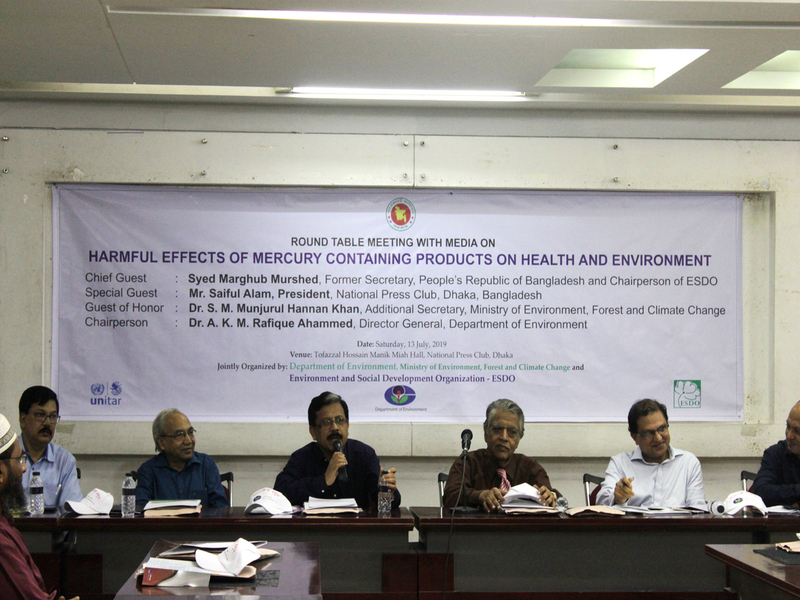Round table meeting on “Harmful Effects of Mercury Containing Products on Health and Environment”

Dhaka, 13 July, 2019: The experts an activist urged the Government to ban mercury added products and emphasized on the harmful impact on mercury causes a serious threat to environment and human health. Mercury pollution has become a global concern now. Focusing on this a roundtable meeting with media on “Harmful effects of mercury containing products on health and environment” held on Saturday, at National Press Club, Dhaka jointly organized by Department of Environment (DoE) and Environment and Social Development Organization (ESDO).
Harmful impacts of mercury in environment and human health was discussed in the meeting. Former Secretary of People’s Republic of Bangladesh and the Chairperson of ESDO, Syed Marghub Murshed was present as the Chief Guest of the meeting. He asked the authority to take initiatives for outlawing mercury added products in Bangladesh for the sake of public health and environmental protection as early as possible. He stated, “Mercury pollution poses a severe threat to public health, with even low levels of exposure causing life-long impacts. If we are truly committed to stopping mercury poisoning, then we have to take steps to ban mercury at its source.”
Mercury is contained in many products, including: batteries, thermometers and barometers, electric switches and relays in equipment’s, CFL bulbs, dental amalgam (for dental fillings), cosmetics, jewelry items, pharmaceuticals. Inorganic mercury is added to some skin-lightening products in significant amounts which are hazardous to human health. All forms of mercury can be accumulated in organisms through the food chain. However, Methyl mercury is a neurotoxicant: it can damage the developing brain as it crosses the placental and blood-brain barriers easily. The threat to the unborn is, therefore, of particular concern. It can also trigger depression and suicidal tendencies, paralysis, kidney failure, Alzheimer’s disease, speaking and vision impairment, allergies etc.
The meeting was chaired by Dr. A.K.M. Rafique Ahammed, Director General, Department of Environment, Dr. S. M. Munjurul Hannan Khan, Additional Secretary, Ministry of Environment, Forest and Climate Change as Guest of Honor, Mr. Saiful Alam, President, National Press Club, as Special Guest, Project Director of MIA Project, Department of Environment, Dr. Masud Iqbal Md. Shameem, as Panel Speaker Professor Md. Abul Hashem, Former Chairman, Chemical Division, BSTI, Dr. Shahriar Hossain, Secretary General, ESDO and UNEP Mercury Waste Expert, Siddika Sultana, Executive Director of ESDO and Executive members of press were present at the meeting.
Meeting chair Dr. A.K.M. Rafique Ahammed addressed the mercury exposure to public health and said, “One group of people who are regularly exposed to high levels of mercury such as populations that rely on subsistence fishing or people who are occupationally exposed. We should save them from this serious exposure.”
“A range of actions are should be taken to reduce mercury levels in products, or to phase out mercury-containing products. In health care, mercury-containing thermometers and sphygmomanometers are being replaced by alternative devices. We need to scale up awareness for using alternatives among the people”- said Guest of Honor, Dr. S. M. Munjurul Hannan Khan.
Mr. Saiful Alam said, “Exposure to mercury threatens our health, with many often irreversible toxic effects .We are seeing mercury public health crisis is increasing. For protecting our future, mercury added products have to be banned right now.”
Dr. Masud Iqbal Md. Shameem said, “The Minamata Convention on Mercury, a major international treaty aiming at protecting human health and the environment from anthropogenic releases of mercury and banning mercury added products by 2020. So it is high time to take initiatives against it.”
Professor Md. Abul Hashem focused more on taking action and said “While the deeply rooted practice of using mercury containing products will not change rapidly, mercury exposure via cosmetics poses serious health but also environmental risks. BSTI has already made a standard for mercury added products which is below 1 ppm.”
Dr. Shahriar Hossain said, “The level of awareness and knowledge about mercury containing products is not significant which creating barrier in reducing or preventing its use. The majority of users of mercury are not aware of the importance of proper disposal of mercury wastes or mercury containing compounds. So it is high time to aware them about its health and environmental impacts. Phase out of mercury added products intervention is now essential before the problem becomes irreversible.”
Siddika Sultana emphasized “Skin-lightening creams containing mercury directly affects skin and can cause rashes, skin discoloration and blotching. Long-term use of such products increases the risk of kidney complications, digestive, immune and nervous systems.”
On the meeting, participants were highlighted that Bangladesh has no specific guidelines regarding the management of mercury in products, or how to safely manage the uses of the products or equipment that contains mercury or mercury compounds. Ratification of Minamata Convention on Mercury is an urgent need. Many countries have already banned mercury containing products while Bangladesh is far behind. So, now Bangladesh should move forward to make formulation of mercury containing products.



